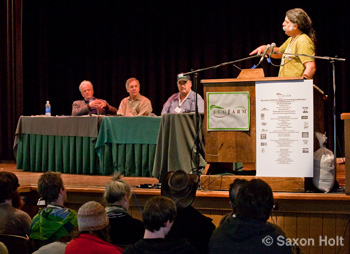Once again The Ecological Farming Conference has got my juices going. These provocative, feisty, and independently minded farmer and ag activists have once more pushed me to a better understanding of sustainable agriculture.
At last year‘s Eco-Farm conference I reported on the confounding difficulty the farming community has trying to even define the term “sustainable agriculture”. That issue basically boils down to farmers not wanting to be pinned down and limited to whatever bureaucratic definition that some agency might create.
Many small farmers almost sneer at the term “organic”. Best farming practices are well beyond the government definition of organic and, in fact, some of the very best sustainable farming practices are about to be limited in the new and well meaning “Food Safety” bill, H.R. 2749, now before Congress.
Many stories about the problems with H.R. 2749 are cited on the website of Wild Farm Alliance. The bill has passed the House and the Senate is expected to vote next session. One of its primary aims is to prevent e-coli in farm crops, especially leafy greens, but typical of much government legislation, its one-size-fits-all approach will be a tremendous burden on small organic farmers.
The constraints on hedgerows, wildlife corridors, and non farm vegetation in proximity to fields (thus encouraging animals who might have e-coli on their feet) will make it difficult for those farmers seeking to encourage bio-diversity as an integrated part of sustainable agriculture. Many studies support farming gone wild, which should come as no surprise to our Gardening Gone Wild readers – let’s give them our support.
A letter from dissenting congressional representatives is posted on the National Sustainable Agriculture Information Service, the language of which can be used by any of you activists who wish to help get this bill amended (Download letter). Contact your Senator and ask for them to work toward making the bill less burdensome on small farmers. I did.
The other interesting bit of controversy erupted at the closing plenary session. Small farming activist Eliot Coleman (seen at far left in the photo) speaking to the CEO of Stonyfield Farms, Gary Hirshberg (sitting next to him) wondered a bit pointedly how small farmers could ever create their own brand (of yoghurt for instance) when big organic corporations, such as Stonyfield, enter local markets – now even in WalMart.
Hirshberg was surprised at the directness of the question, which I suspect was asked simply to provoke a dialogue, but he admirably defended the work of larger collectives of farmers to get the price of organics down to a level where they can be afforded by all.
The price of organic products is the biggest barrier for most consumers, so it was quite enlightening to hear farmer Dick Peixote (seated at the far right) say the cost of farming his 1700 acres organically is no more than the cost of conventional farming. He sometimes sells his organic produce in both markets. The consumer never knows it’s organic.
The Eco-Farm group has come a long way in 3o years. Way back then (!) there were few sources of organic information or materials, and little understanding of the word. Now we are beyond organic, and one of Eco Farm’s own, Kathleen Merrigan, is Deputy Secretary of USDA.
Small farmers need a bigger voice in government. More than once I heard speakers hearken back to days when government actively supported the citizen farmer. In the words of Thomas Jefferson: “Cultivators of the earth are the most valuable citizens. They are the most vigorous, the most independent, the most virtuous, and they are tied to their country and wedded to its liberty and interests by the most lasting bonds.”
Support your local farmers; they sustain us in many ways.

